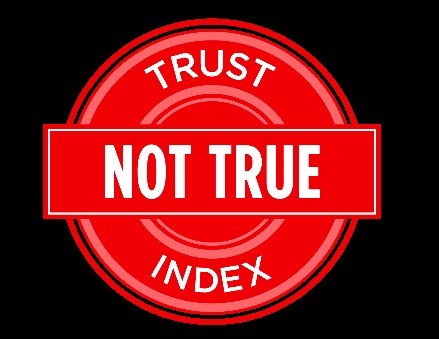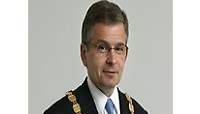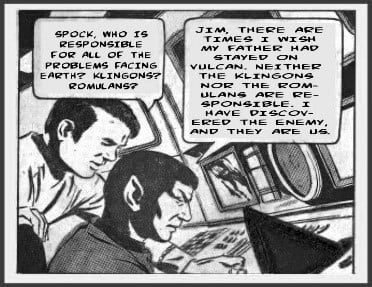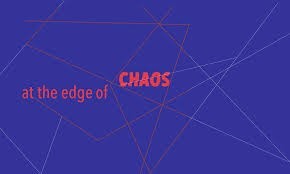We have arrived at a time when, no matter who is speaking, or what we are reading, we are questioning the information: fact or fiction. I have come to a point where I do not even trust recipes from MarthaStewart.com.
Inept leaders from both the public and private sectors have so polluted the global notion of truth that unless we are brain dead, it is prudent to trust no one, except, perhaps the motto of the United States, “In God We Trust.” According to Pew Research, only 20 percent of US adults trust the government in Washington, DC to “do the right thing” always or most of the time (September 14, 2020, pewresearch.org).
Substitute Truths
Research (2018) by Richard Edelman, (President and Chief Executive Officer of the public relations company) found that the loss of trust may be grounded in the reality that it is harder to determine what is and what is not true.

We can query as to whether there are there boundaries between fact, opinion, and misinformation. When the US Counselor to President Donald Trump, Kellyanne Conway said, during a Meet the Press interview (January 22, 2017), in defense of the White House Press Secretary Sean Spicer’s false statement about the attendance numbers at Donald Trump’s inauguration as President of the United States, Conway responded that Spicer was giving, “alternative facts.”
David Bersoff, a Researcher with Edelman determined that democracy is based on a shared understanding of facts and information that can be used for negotiation and compromise, “When that goes away, the whole foundation of democracy gets shaken.” Thanks to COVID-19 and the missteps of global leadership, the world has become chaotic, riddled with uncertainty and when this dominates the landscape, authoritative power moves onto the stage.
The tourism industry, previously a central pillar in world economies, has ceased to exist in the form we knew it (as recently as 2019). Unfortunately, the industry, long susceptible to disasters, has not been able to create or find a path that leads to the rebuilding of consumer trust. Instead of providing facts and figures, consumers are fed lies based on faulty research or Magical Thinking, with the belief that the misinformation will sway the hearts, minds, and credit cards of people, getting them back on planes, trains and into rental cars, anxious to make reservations for holiday and business travel.

It is not news that disasters (natural and man-made) have a negative impact on the number of tourists and the tourist experience. In the case of COVID-19, the disaster is both natural (a virus) and man-made (spread has not been controlled) leading to global economic and health care crises.
The tourism industry has survived previous catastrophes: the Indian Ocean tsunami killed more than 225,000 people in the region (December 26, 2004), leading to a decline in tourism to the Maldives; the European airline industry lost approximately 2.5 billion Euros under the influence of the volcanic ash cloud generated by the Iceland volcanic eruption (2010). The 9/11 attacks in the United States (2001), impaired the trust of tourists and required a long-term recovery period that lasted almost four years. The 2008 financial crisis reduced international tourism by 4 percent. However, with the arrival of COVID-19, and the absence of strong leadership and reliable information, travelers learned to doubt the safety and security of tourist destinations and attractions, prioritizing safety and security over a step into the unknown.
Calamity
Researchers define disasters as “a serious disruption of the functioning of a community or a society causing widespread human, material, economic or environmental losses which exceed the ability of the affected community or society to cope using its own resources.” The growing sense of insecurity caused by the pandemic means that the attractiveness of a tourist destination is largely determined by its acknowledgment of the virus and assurance of the destination’s safety and security. Attractions are important contributors to the success of a tourist destination; however, they are not enough to be a condition for success, because, “no safety no tourism.”
Political leaders, business executives, domestic and international media have alerted everyone on the planet to the risks associated with COVID-19, encouraging (if not forcing) isolation and quarantine, highlighting the dangers associated with groups and travel. These warnings, combined with economic devastation, created an atmosphere of fear that does not provide an environment for business or leisure travel, resulting in the almost total obliteration of the worldwide hospitality industry.
The Disease

Unless you have been living under a rock, it is common knowledge that the Coronavirus disease (COVID-19) is infectious and caused by a novel coronavirus (SARS CoV 2). Current evidence suggests that it is primarily transmitted between and among people through droplets of saliva or discharge from the nose when an infected person coughs or sneezes, and others have direct or indirect contact with these secretions. Fever, cough, loss of or change to the sense of smell or taste, chest tightness, muscle aches, fatigue, and shortness of breath are the main reported symptoms.
While most people infected with the virus will experience mild to moderate illness and recover without requiring special treatment, there are groups of older people (with underlying health problems) that are likely to develop and experience a more severe form of the disease. In addition, Black, Asian and Minority Ethnic groups are likely to have more serious cases of this illness.
Lies

Since March 2020 it has become obvious that COVID-19 is not the flu or a cold, although there are world leaders in both the public and private sectors that have tried to convince us otherwise. Lies travel quickly; how quickly? Cordell Hull, US Secretary of State and “father of the United Nations,” thought that, “A lie will gallop halfway around the world before the truth has time to pull its breeches on (1948).” His observation took place in the middle of the 20th century, before Twitter, Facebook, and Instagram. In 2020, a lie becomes a fact in nanoseconds.
Since COVID-19 became acknowledged as a pandemic it has infected over 49.6 million people and killed more than 1.2 million (CNN.com, November 7, 2020) and the lies associated with the virus have been propagated through social media. The misinformation has been supported by world leaders with no background or experience in science and pushed by medical and political professionals with questionable education, experience and motivations.
The spreading of misinformation (or alternate facts) is a complex process that intersects many disciplines from digital research to psychology, psychiatry, and the behavioral sciences with links to public relations, advertising and marketing. The opportunities to lie have been nurtured over the past decades by the increase in advertising and public relations where the truth may be hidden or obscured by the need to sell a product, motivate consumers to overlook the shortcomings of a product or service and/or switch the wants/needs of consumers to a product/service that is available at a higher price.
The hotel, travel and tourism industry has been complicit in perpetrating misinformation to would-be travelers. Travel and leisure magazines airbrush photographs of hotels, restaurants and celebrities, hiding the cracks in the cement, the fungus growing in the swimming pool, the absence of sand on a beach, and the fact that the celebrity enjoying a holiday is being paid handsomely for permission for them to be seen at the resort (at which they are being hosted).
The hotel concierge recommendation for the best restaurant, night club, or dentist may not be unbiased. The property may have a relationship with a local restaurant (or owned by the hotel manager), or told there is nothing nearby as good as the hotel dining room, or the concierge is paid a finder’s fee for steering guests to a particular shop or attraction.
Car rental companies try to cheat their clients with a sales pitch that encourages the purchase of excessive insurance that is unnecessary; charged for damages they did not create; over-charged for fuel; misled about pricing and seduced with “complimentary” upgrades that may include hidden fees.
Restaurants lie. Under most circumstances the “wild mushrooms” on the menu are farm-raised. The balsamic vinegar (made from reduced grape must that is aged for years or decades, in wooden casks) is unlikely to be actually served at the burger joint. The menu may call it Balsamic, but is more likely red wine vinegar with caramel color and sugar. Most dishes with “truffle” in the name do not contain truffles; frequently the customer is being served olive oil infused with synthetic flavorings designed to mimic true truffles’ scent.
Destinations lie. Caribbean islands claim the baskets in the straw market were made by local craftspeople; look at the flip side of the item and it is clear it was made in China. The Dominican Republic’s public relations and advertising campaigns feature beautiful beaches and fabulous hotels. What is not shared is the fact that it carries a US Department of State Level 2 Travel Advisory for armed robbery, homicide, and sexual assault.
Travel Influencers lie, claiming that the destination is picture-perfect. A moment for a reality -check…even the most charming “instagrammable” places have real-world problems like homelessness, stray animals, water pollution, and crime.
Cruise lines are notorious spreaders of misinformation which can, unfortunately, lead to illness and death. The latest dose of misinformation focuses on the supposedly safe environment for passengers, encouraging guests not to worry about COVID-19 (or other communicable diseases like the Norovirus). They also claim the voyage will be safe. Fact check: 2018, cruise lines reported 120 alleged crimes (i.e., assault, kidnapping, assault with serious bodily harm, firing or tampering with vessel and theft of over $10,000) (Department of Transportation – DOT); 2020, Center for Disease Control determined that from March 1-July 10, 2020, 2,973 cases of COVID-19 or Covid-like illnesses occurred on cruise ships with 34 deaths. During this same period, there were 99 outbreaks on 123 cruise ships representing 80 percent of US jurisdiction ships.
Cruise lines may claim to be environment friendly; however, many dump waste into the ocean. In 2016 Princess Cruise Line paid $40 million in fines for dumping “oily waste” into the ocean. Research finds that cruise ships contribute 24 percent to the total solid waste generated by maritime traffic around the world; luxury vessels can produce seven tons of garbage and solid waste in a single day. Studies also determined that the air on the aft areas of cruise ships, (particulate matter pollution), is as polluted as the air in major polluted cities in the world, such as Beijing, PRC (marineinsight.com).
.
Consumers are encouraged to “fly the friendly skies,” while they are shoveled into spaces the size of a child’s shoe; fed high-calorie, low nutrition snacks, and forced to pee in unsanitary spaces that would not meet a baseline standard in a third – world country. Currently, airline executives want travelers to buy into their newest story-line that finds that flying is safe and COVID-19 would not have the temerity to enter their cabins. What they fail to point out is that the Harvard study was paid for by the airlines.

Trust. The Final Frontier
Even with a new president in the White House, COVID-19 with its death and destruction, will not disappear over a glass of champagne. Even when this pandemic is tucked into the history books, other viruses are waiting in the wings.
It will take years for consumers to feel comfortable about traveling to faraway places with strange-sounding names and an even greater amount of time to trust the purveyors of hotel, travel, and tourism products and services.
Research by PWC.com on what consumers want from the hospitality industry found that:
1. Safety is at the top of the consumer list and they are willing to pay for it.
2. Consumers want factual information with 85 percent indicating that travel decisions hinged on communications received from hotels and airlines about safety; however, 40 percent said they were unsatisfied with the communications they are currently receiving about safety protocols.
3. Sanitization extends to parking services that will reassure guests that the hotel understands their priorities.
4. Consumers are seeking destinations that are adequately equipped with healthcare facilities. Knowing they will be around other people (which may present risks) they are wary of the transportation modality and their accommodations.
5. 43 percent of consumers are likely to spend more to confirm physical distancing on their next flight while families with children are willing to pay 60 percent more.
6. Consumers are putting their faith in brands they trust, equating brands with cleanliness.
7. In the past, price, loyalty programs, location and airline schedules carried fairly equal weight, today, brand trust is linked to confidence in safety and cleanliness and can lead to new business.
8. 75 percent of respondents said employees wearing PPE and third-party certified sanitation reviews offered them a sense of security.
9. People want to travel. It is likely that the 18-40-year-old consumers will lead the charge with 13 percent indicating they will travel more in the future then they did in 2019.
10. Destinations that are not peaking with COVID-19 19 are more likely to see new visitors – if there is adequate contact tracing and hospital capacity.
11. A vaccine is likely to inspire confidence for potential travelers; however, they are also seeking easy access to testing at their destinations.
12. Consumers want control of their environment.
13. Driving takes precedence over flying.
14. Hotels should use data-driven marketing to target consumers most likely to stay at their properties within drive distance – in the short-term.

Truth
Who travels, when and where, will be influenced by government officials easing restrictions, companies designing travel policies for their employees, and scientists producing vaccines and treatments.
Consumers want to be reunited with the good feelings they obtain by being on holiday; however, in light of COVID-19, they want to have fun, be protected, and feel safe. They want to be informed on what the industry players are doing to improve their safety standards, based on protocols provided by trusted sources. There is a new player in the hospitality field – and it is TRUTH.




